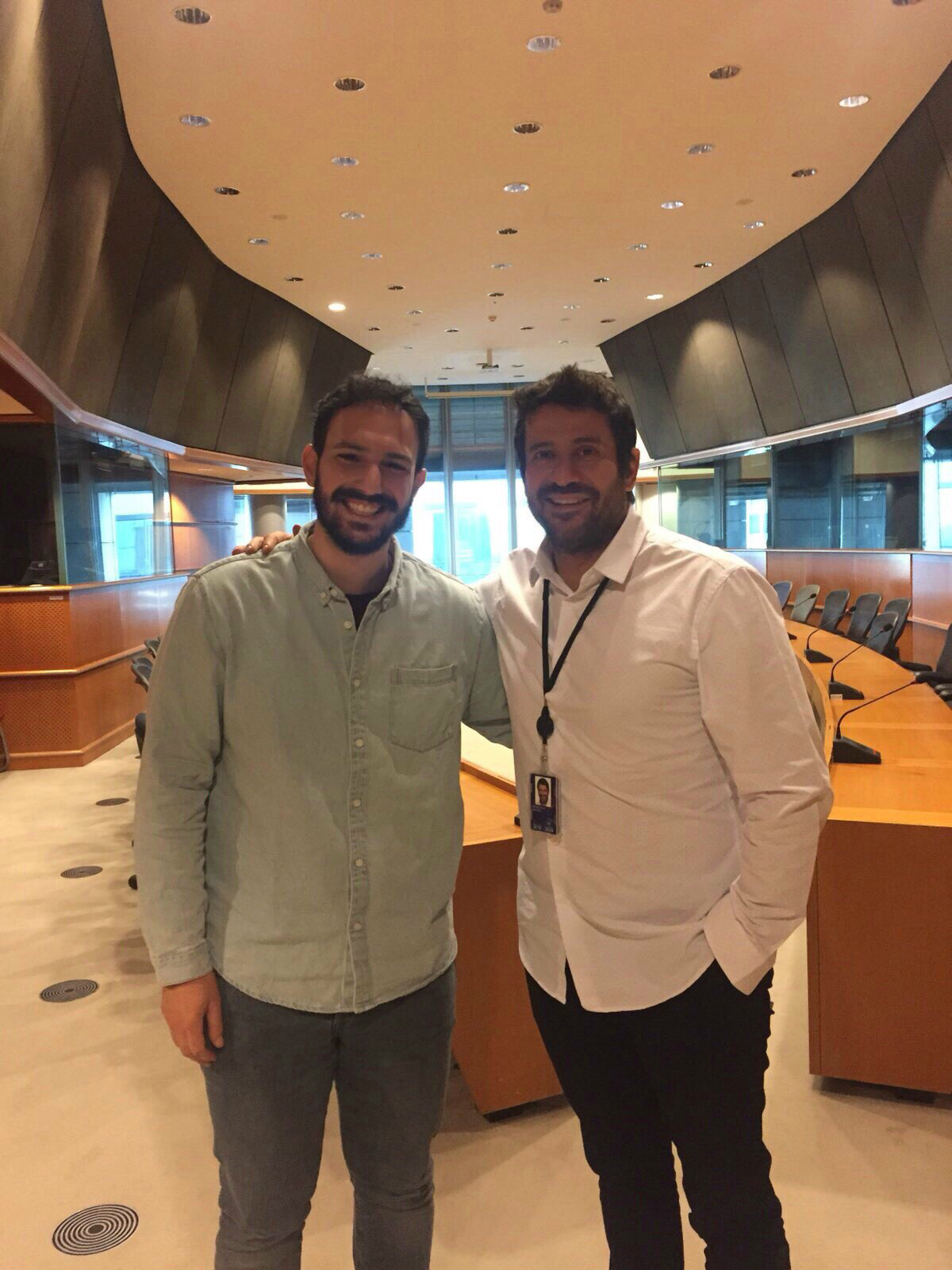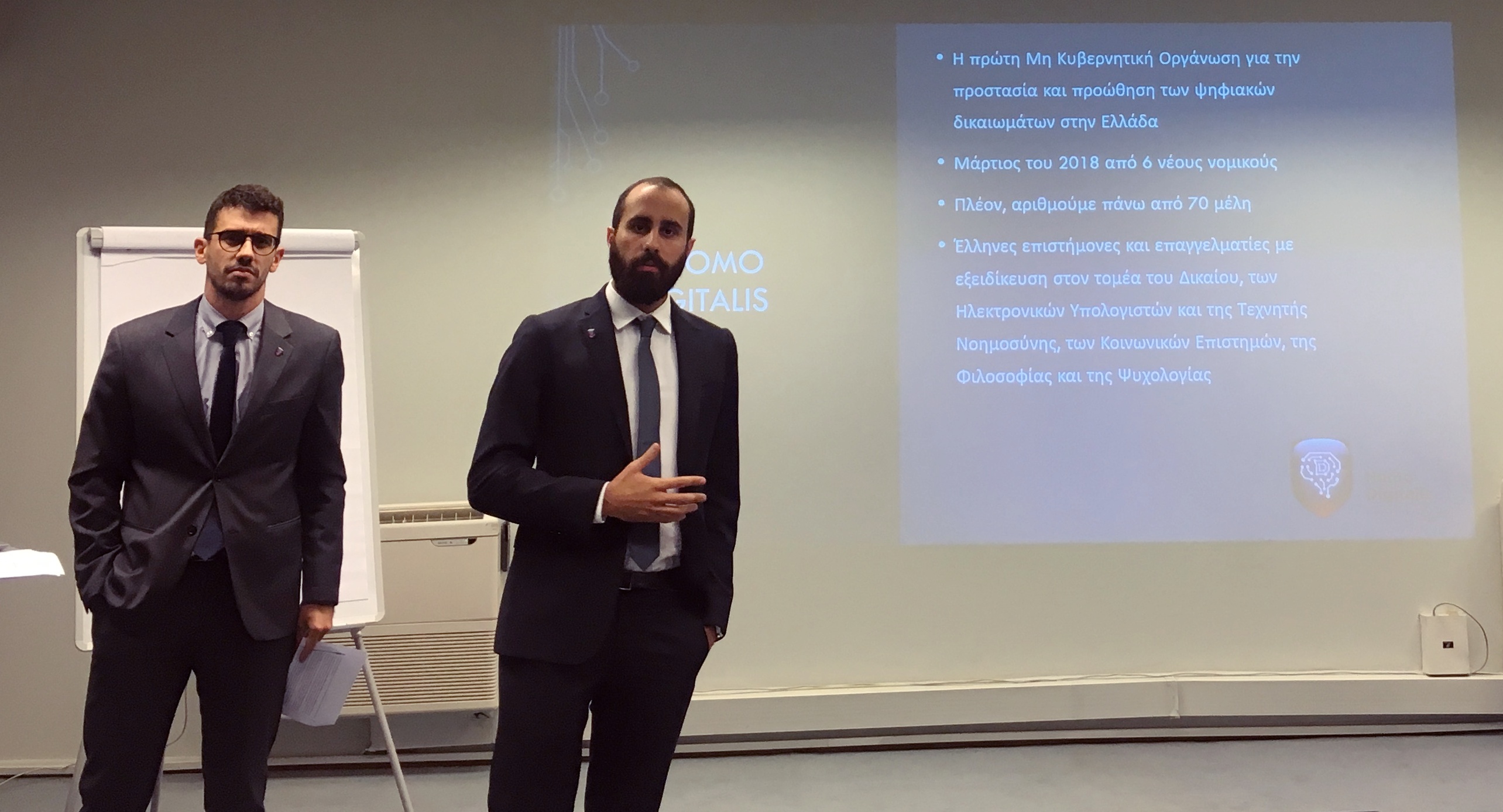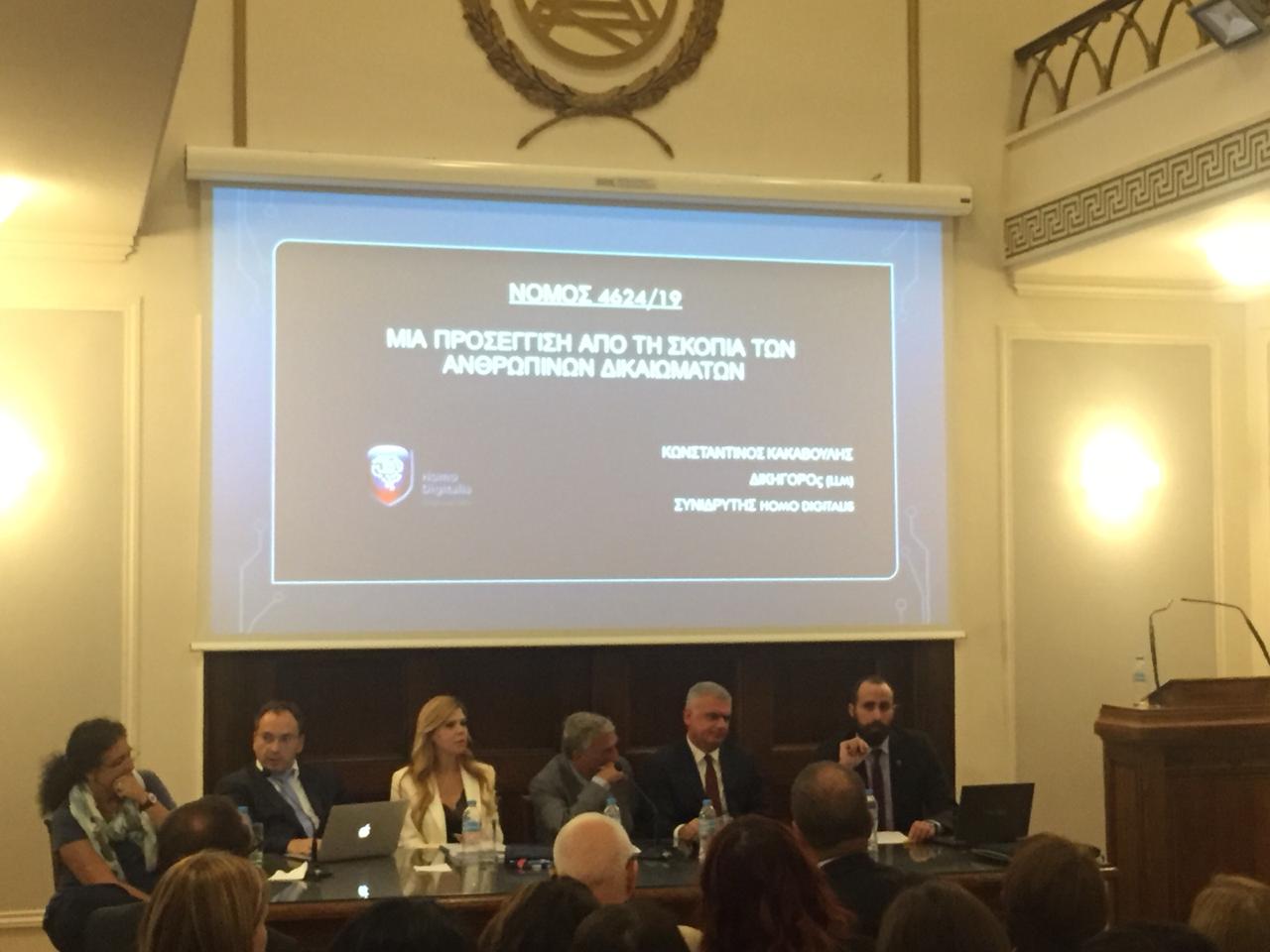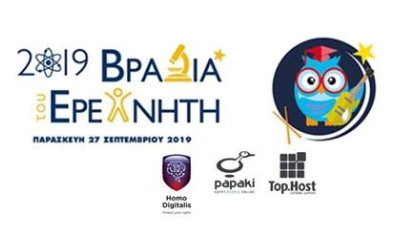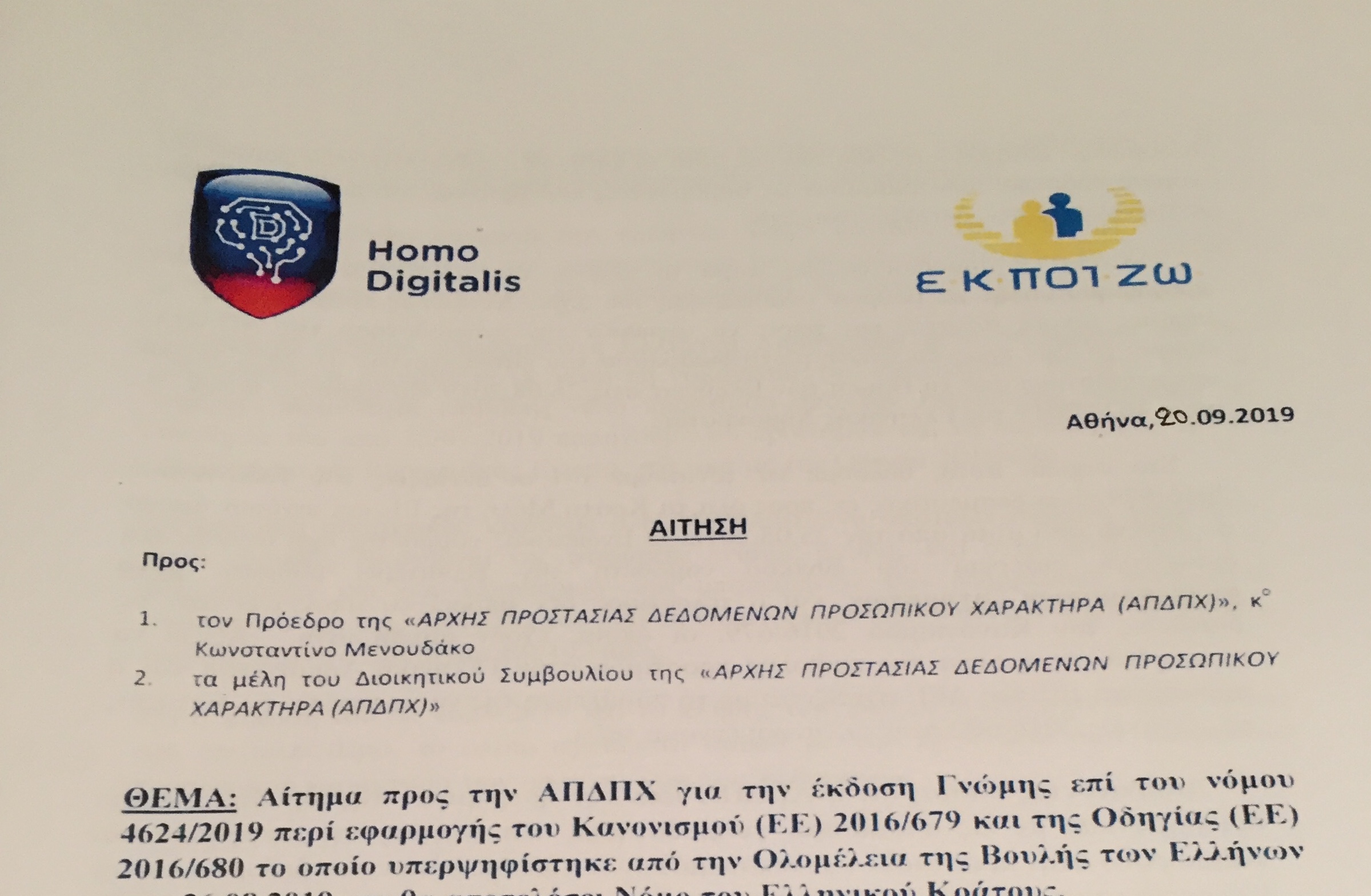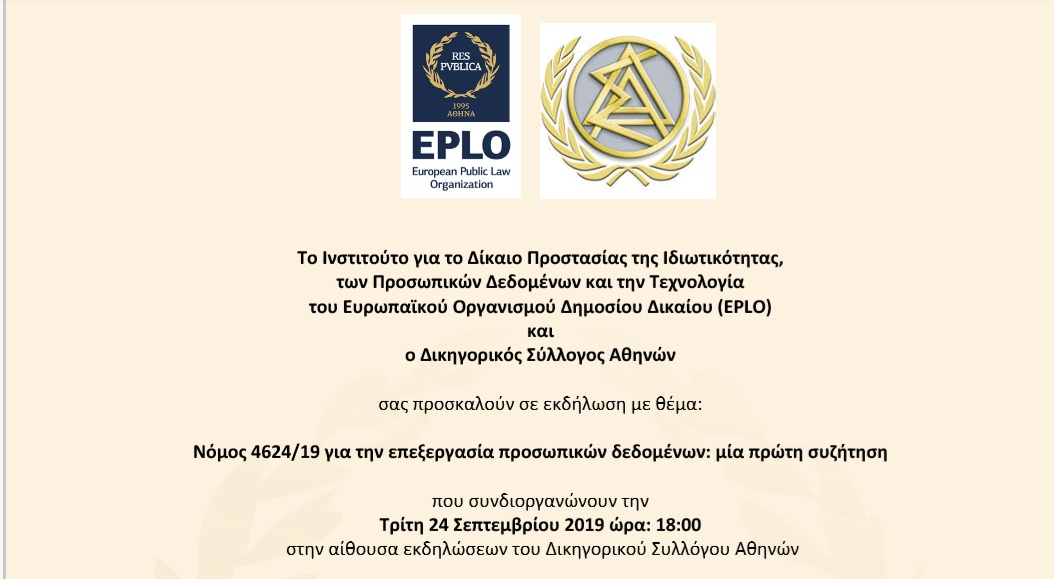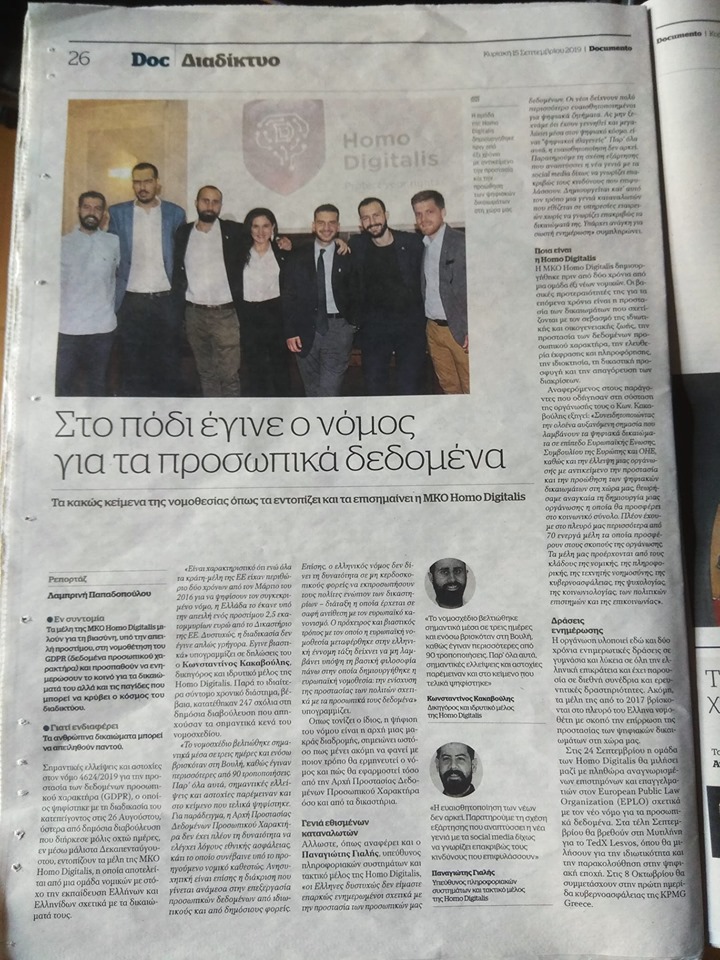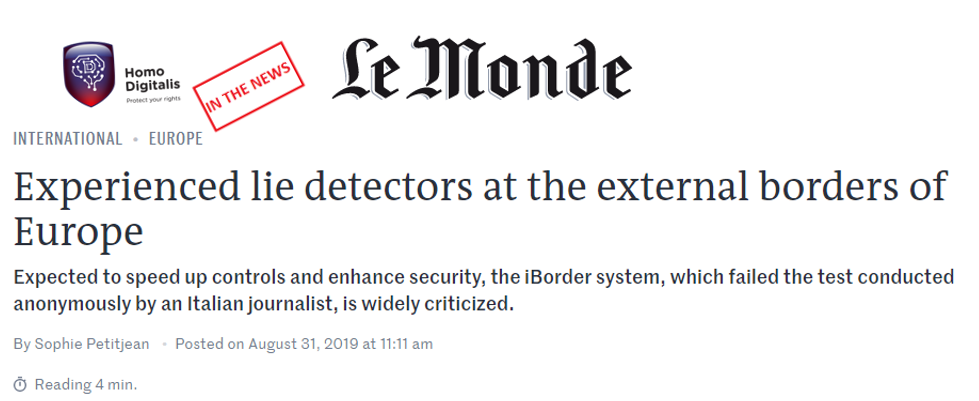Homo Digitalis meets MEP Alexis Georgoulis and his team at European Parliament
On October 2, 2019 Homo Digitalis had the great honour and pleasure to meet Mr. Alexis Georgoulis, Member of the European Parliament (MEP) and his team lead at the EP, Mr. Manos Kalaintzis.
The discussion was very productive and we had the chance to get informed about updates on the question of the use of the application FaceApp raised by MEP Georgoulis earlier in July 2019 and the official response he received a few days ago by Commissioner Jourová on behalf of the European Commission.
We also talked about the actions and goals of Homo Digitalis and the importance in raising the awareness of Greek public regarding the protection of their personal data and privacy during the current digital age.
At the centre of the discussion was the new business model of the tech giants of on-line services, whose income come largely from targeted advertising based on the collection of personal data as well as the monitoring conducted by ad network providers and intermediaries and the use of cookies.
Finally, we talked about Freedom Not Fear 2019 and the annual meeting of activists regarding the protection of personal data and privacy, which will take place between 8 – 11 November in Brussels.
We remind you that registrations are still open and you can apply for travel allowances. Very few seats are available. You can learn more on our website here (in Greek).
We would like to wholeheartedly thank MEP Alexis Georgoulis and Manos Kalaintzis for the interesting, constructive and productive discussion and meeting. It is satisfying and encouraging to notice that MEPs and their teams have such a strong interest in the protection of Human Rights in the modern digital era and we would be delighted to stay in contact in the near future.
We would be delighted to meet other MEPs and their teams in order to discuss and exchange ideas! ‘Freedom not Fear 2019’ appears to be a good occasion as many of our members will be in Brussels between 8-11 November 2019. You are more than welcome to contact us on info@homodigitalis.gr
Homo Digitalis’s Presentation at Hellenic (ISC)² Chapter
On September 26, 2019, Homo Digitalis’s Konstantinos Kakavoulis and Emmanouil Tzivieris attended the OTE Academy premises in Maroussi of Attica region, invited by the Hellenic (ISC)² Chapter and its President, Mr. Dimitrios Patsos.
They made a presentation to the members of the Hellenic (ISC)² Chapter and discussed Homo Digitalis’s interesting activities, as well as the new Greek law 4624/2019 regarding personal data processing.
After the presentation, discussion was held with the members of Hellenic (ISC)² Chapter.
The (ISC) 2 is the international professional association for information security.
We would like to wholeheartedly thank Mr. Patsos and all the members of the Hellenic (ISC)² Chapter for their invitation.
Homo Digitalis on a seminar discussion regarding Law 4624/2019
On September 24, 2019 Mr. Konstantinos Kakavoulis represented Homo Digitalis in a seminar about the initial discussion regarding the newly adopted Law 4624/2019 on personal data.
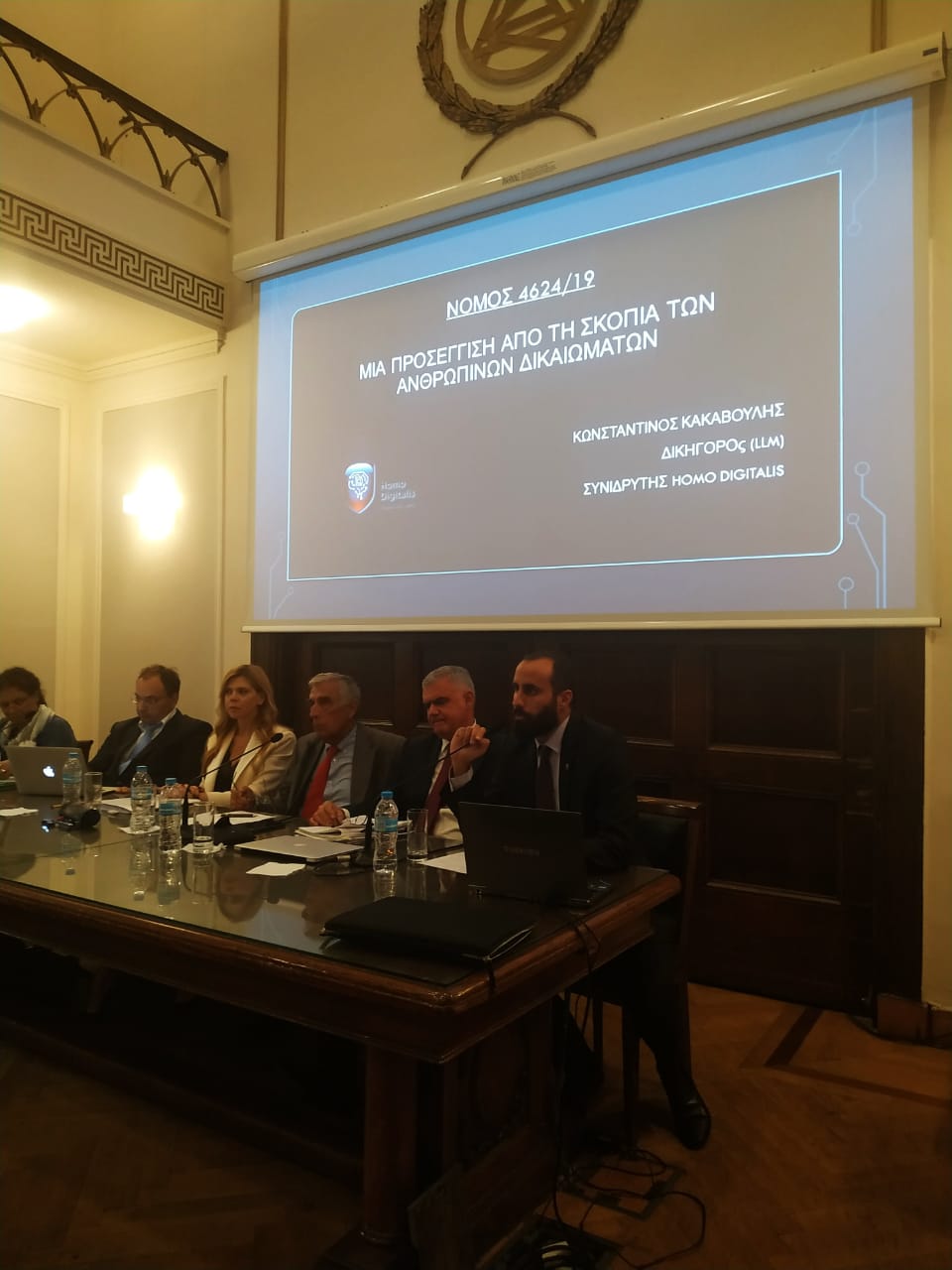
Mr. Konstantinos Kakavoulis during his presentation and speech
The event was held by the Institute for Privacy Law, Data Protection, and Technology, established by the European Public Law Organization (EPLO) and the Athens Bar Association.
Athens Bar Associations’ events venue was full of professionals and people who wanted to get informed on this new legislation and the audience was highly engaged in the discussion.
Mr. Kakavoulis’s speech was focused on human rights violation, which may result from the newly adopted law.
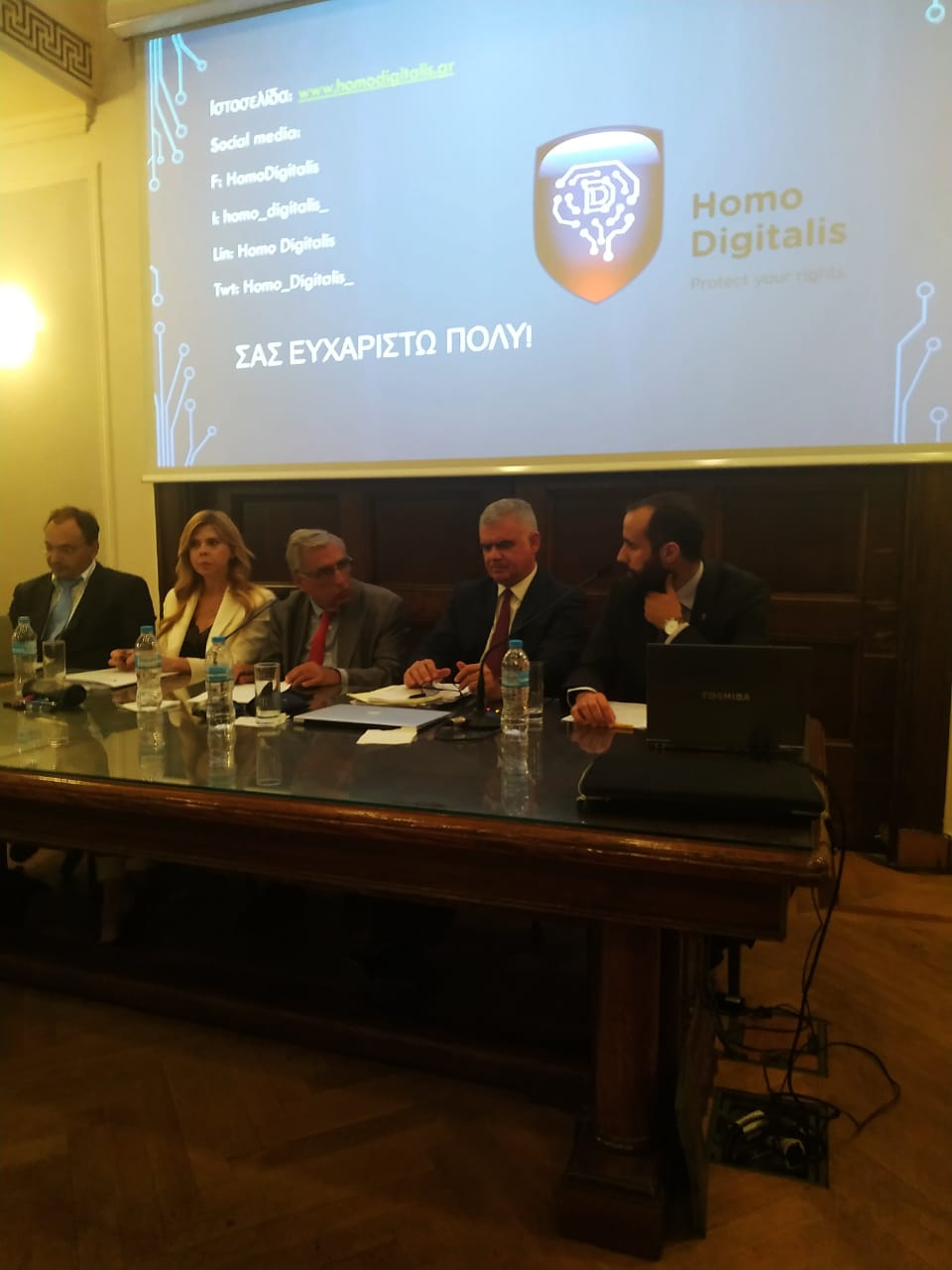
A discussion followed, the coordinator of which was the President of the Hellenic Data Protection Authority, Mr. Konstantinos Menoudakos
Homo Digitalis at Researcher’s Night 2019!
After the successful conclusion and Homo Digitalis’s participation in the Researcher’s Night 2018 in Athens, our organization is delighted to participating in the Researcher’s Night 2019 in Heraklion of Crete!
The event will take place on Friday 27 September 2019 from 17:00 p.m. to 23:00 p.m. in the premises of the Foundation for Research and Technology – Hellas (“FORTH”) and the entrance is free of any charge.
We want to wholeheartedly thank Papaki and Top.Host for the collaboration in preparing this event.
You are more than welcome to come to this interesting event and meet with Homo Digitalis team and enjoy a night of awareness and knowledge. Your presence is highly appreciated!
For more information on Researcher’s Night 2019 and other events in Greece during the Researcher’s Night 2019 click here.
Official Request to the Hellenic Data Protection Authority for the issuance of legal opinion on Law 4624/2019
Today, Homo Digitalis and the Consumer Association “Quality of Life” (Ε.Κ.ΠΟΙ.ΖΩ), filed a request jointly before the Hellenic Data Protection Authority in order the Authority to issue a legal opinion regarding the newly adopted Law 4624/2019 implementing the Regulation (EU) 2016/679 (GDPR) and Directive (EU) 2016/680.
The Data Protection Authority has played an active and crucial role in protecting the rights of Greek data subjects with the issuance of many decisions, opinions and guidelines, and we believe once again, they will exercise their supervisory, advisory and investigative powers.
Ηowever, in the light of Article 58 GDPR, and in order to highlight the omissions of the mentioned national law, we officially filed a request today in order the Authority to issue an opinion on the consistency of Law 4624/2019 compared to the provisions of Regulation 2016/679 and Directive 2016/680.
You can view the full text of our joint official request (filing no: 6354 / 20.09.2019). The text is accessible in Greek here.
Law 4624/2019 on personal data: An initial discussion
On Tuesday the 24th of September 2019 at 6 p.m. the Institute for Privacy Law, Data Protection, and Technology, established by the European Public Law Organization (EPLO), and the Athens Bar Association are holding an event under the name:
‘Law 4624/2019 on personal data: An initial discussion’
at Athens Bar Associations’ events venue.
As the keynote speaker,representing Homo Digitalis, Mr. Konstantinos Kakavoulis will commence a discussion regarding personal data, along with distinguished academics and professionals in the personal data sector in our country.
Participating in the event will be free of charge, but due to limited spacing you are kindly requested to make a reservation by sending an email to: afiumi@eplo.int .
Detailed Events Programme:
Greeting:
Dimitrios Vervessos, Head of Athens Bar Association.
Speakers:
–Lilian Mitrou: Professor of Privacy and Information Law University of the Aegean (Dept. of Information and Communication Systems Engineering)
–Ioannis Iglezakis: Law Professor at Aristotle University of Thessaloniki
–Hara Zerva: Lawyer, D.E.A., GDPR expert, DPO,
–Konstantinos Kakavoulis: LLM – Lawyer, Homo Digitalis
–Panagiotis Perakis: Lawyer, B.O.D. member of Athens Bar Association.
Mr. Konstantinos Menoudakos, President of Hellenic Data Protection Authority (HDPA), Honorary Chairman of the Council of State, will be the events’ coordinator.
Discussion will be held afterwards.
It should be mentioned that the event will be recorded, and the proceedings will be transcribed on a later stage for their publishing. Finally, pictures will be taken.
Interview with the Senior Director Government Affairs of Symantec, Ilias Chantzos
His title merely impresses: “Senior Director Government Affairs EMEA and APJ, Global CIP and Privacy Advisor” for Symantec, a leader company in the Cybersecurity sector.
In other words, Mr Ilias Chantzos is the person responsible for the intergovernmental relations of Symantec for almost every state of the globe (apart from America), regarding Cybersecurity and data protection issues. Symantec, is one of the leading companies of Cyber Security software worldwide, with hundreds of millions users.
After all, who is not familiar with ‘Norton Internet Security’, Symantec’s most popular and No 1 product for customer protection?
Our first contact was at Data Privacy & Protection Conference where he vividly presented the topic of security breaches and the notification of such breaches. We kindly asked him to share his views on the contemporary developments on the sector as well as the role of NGOs. Despite his busy schedule, he ardently accepted our invitation. We thank him thus, for this extremely interesting interview.
In Greece, entire generations have been brought up in the framework of ‘Rightsism’ and ‘politically correctness’ Τhe crisis we experience is both economical as well as moral.
– HD:The implementation of GDPR and NIS renders Europe as a pioneer in the creation of an integrated, prescriptive setting for Cybersecurity and data protection. What are the next steps?
IC: Initially, the first step is the full implementation of GDPR. And this will become viable through the adaptation of individual rules, such as the guidelines set by the European Data Protection Board (EBPB), the imposition of fines functioning as impediments to the non abidant organisations and through solving issues arising from data transmission, especially to America. The latter acting as a sticking point to mutual interests of great, private companies.Then, adequacy decision with other countries, such as Korea will follow, which will eventually create a great secure flow space and, of course, the final decisions regarding e-privacy Regulation.
-HD: On that occasion, let me ask you about the efforts and the enormous funds that are allegedly spent within lobbying settings from giants in the technology sector such as Google and Apple on favorable e-privacy conformation towards them.
ΙC: Well, isn’t it reasonable for the companies to be interested about rules that concern and directly regulate them? The industry’s interests are not common, rather than different and dissenter. If, for example, a regulatory context is favorable for company X, the same context will be less favorable for company Y which operates in a similar but not the same sector. The same happens with e-privacy.
Companies are ‘fighting’ each other because their interests are not common. Ιn Greece there is neither the conscience nor the full picture of the entrepreneurship interest due to the demonising of profit and entrepreneurship that emerges from the past’s ideological stiffness. We should not face the industry as a caricature of a bad capitalist, but realistically through the prism of complicated relations and existing interests. Τhis is the only way that bodies will perform correctly. Let’s give an example that everyone in Greece will easily understand. The legislature regarding dual tanks in sea-going tankers is supposed to protect the environment from oil leaks. This type of legislature is supported by environmental NGOs and shipyards (an industry that mostly pollutes. . . Can you spot the paradox already?) because it can be translated into brand new orders. Ιt will be supported by the coastal states of European Union but it is not useful to Greece (which has the greatest coastline and tremendous tourism), which has mostly sea-going shipping since it augments its costs while having zero income from its shipping.
Can you spot how many contradictions there are in one simple example and we haven’t even discussed about local communities that have suffered sea contamination and the tourism industry.
-HD: You mentioned fine imposition earlier. Recently, we watched huge companies such as Google, British Airways and Marriott being imposed tremendous fines leaving everyone believing that no one is immune within the Cybersecurity and protection of privacy sector. Thus, if the ultimate protection and secure processing of personal data is impossible, then what is at stake here? Why all this is happening?
IC: In the companies that you mentioned, fines were imposed for different reasons. Regarding the Google case, fines were imposed for lawfulness of data processing , and more specifically their collection and processing, whereas in Marriott and British Airlines cases fines were imposed due to restricted data protection measures. There is no absolute security to anything in life, the same stands for security. The authorities though, did evaluate that those companies should have protected data much more attentively. Unfortunately, that was not applied this way and this is the reason that fines were imposed, indicating that privacy protection is a top priority.
-HD: In Greece, why do you believe that fines are not equally high?
IC:There are many factors implicated.Up to date greek companies invested in highly essentials. In state of economic crisis you do what is necessary to ensure smooth operation. Current fines are calling for the national companies which want to sell products and services abroad to answer a critical question that every foreign client will ask: “ Can you protect my personal data effectively? ”. Ι understand that small and medium sized enterprises comprehend security mainly as a cost. It is like car insurance which you may never use.
Nevertheless, security can become a competitive advantage. Even if we are kind of left behind, middle sized enterprise should keep up and improve its products and services quality. Quality will make you competitive. I understand that this quality might increase your cost but you belong in the European Union. You have to play according to these rules!
-HD: How do you perceive the NGOs role in this sector? What would you advise an organisation such as Homo Digitalis in order to make their action more effective?
Do not act as ‘rightsists’. In Greece, entire generations have been brought up in the framework of ‘Rightsism’ and ‘politically correctness’ Τhe crisis we experience is both economical as well as moral.This, of course, does not mean we have to stop fighting for our rights. We ought though, with every enquiry that we make to be well informed of its losses and its gains.Which are the consequences of our choices. Not blindly ask just because we can.
It’s the so called ‘occassional cost’. Namely, you should be informed as far as possible which are the other options, that you rejected, before the finally chosen. It is not possible, for example, based on the current business model, to ask for free internet without accepting advertisements (it should be noted that I do not like them).
You don’t like advertisements? No problem, can you afford to pay for the service you receive or to ensure the share of privacy you want? Ιt’s not enough to ask. You also have obligations. Unfortunately, we are victims of the trend “I need X at all costs”, without having thought what we lose or what we accept. It is indicator of maturity and resistance to populism to be able to distinguish easy rightsism from the one that is really in our interest. This is the biggest challenge in my opinion for all NGOs.
Homo Digitalis in DOCUMENTO newspaper
Today, Sunday 15th September 2019, Homo Digitalis’s members, Mr. Konstantinos Kakavoulis and Mr. Panagiotis Gialis gave an interview in Documento newspaper.
The two members of our organization had an interesting discussion with Documento’s journalist Ms. Labrini Papadopoulou about our organisation, our goals, the level of Greek residents’ awareness regarding personal data and the new Greek Law on the processing of personal data. They also set out Homo Digitalis’s upcoming actions seeking to raise awareness, knowledge and dissemination of information.
The interview can be found on page 26 of the newspaper.
Homo Digitalis in Le Monde newspaper
On August 31, 2019, the French newspaper Le Monde featured an article about iBorderCtrl, in which the actions of Homo Digitalis at the national level were also mentioned
